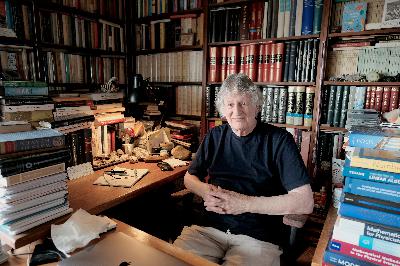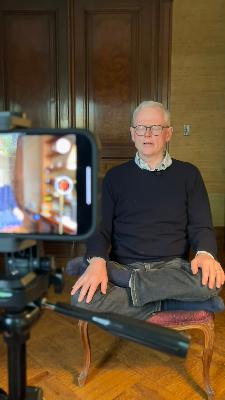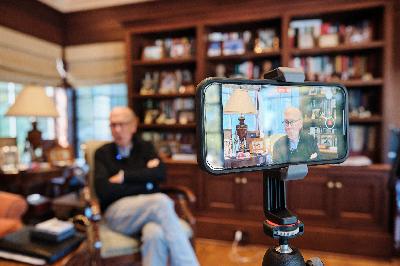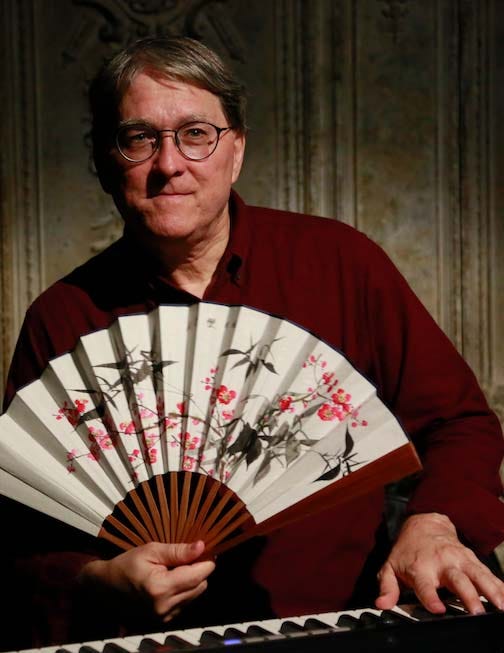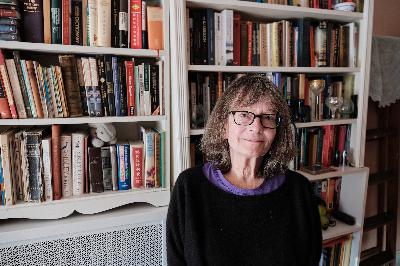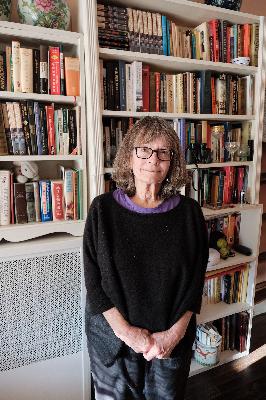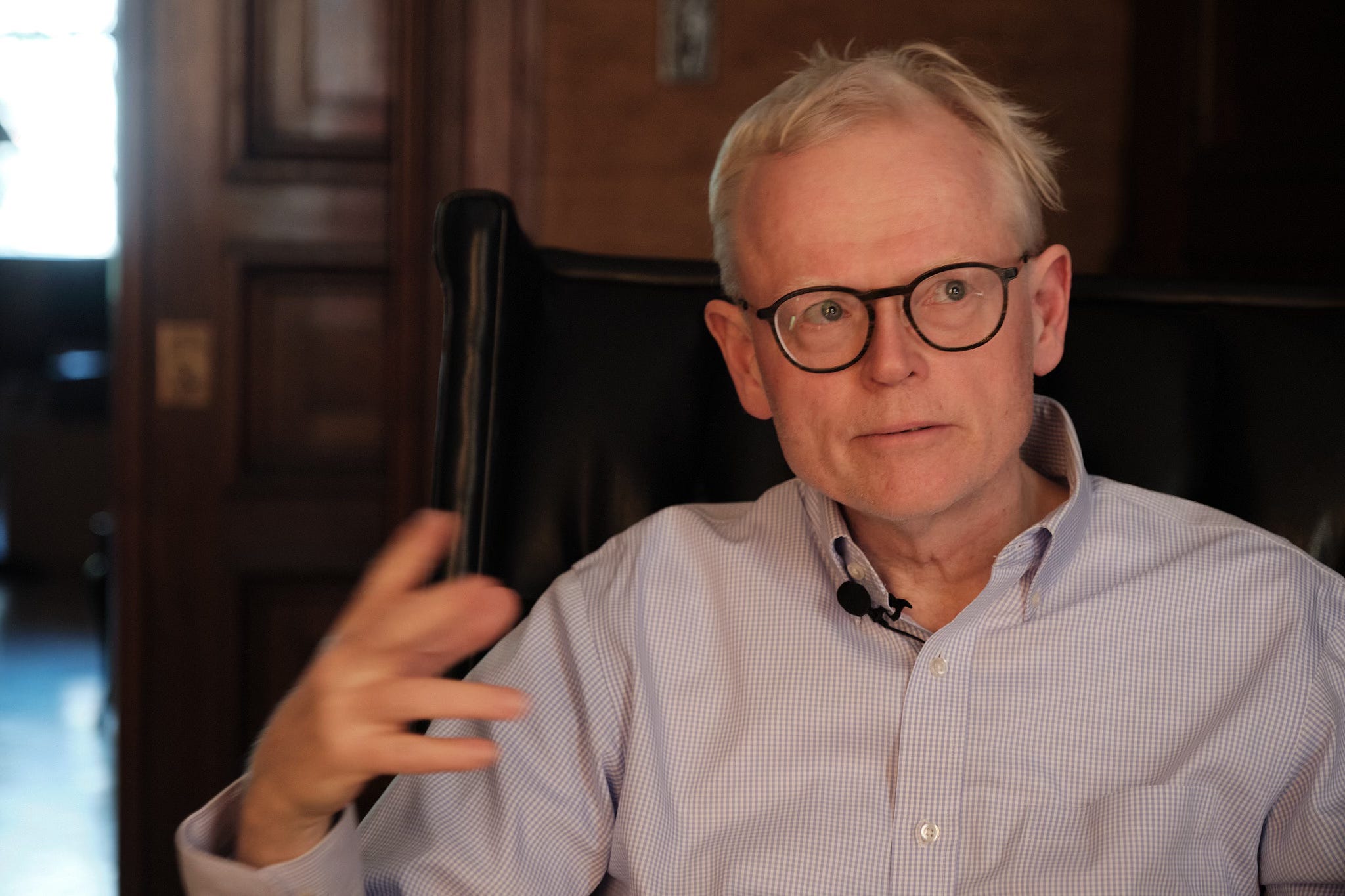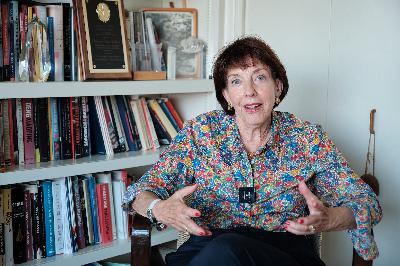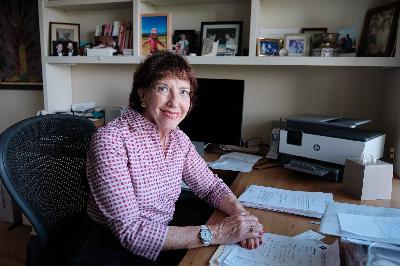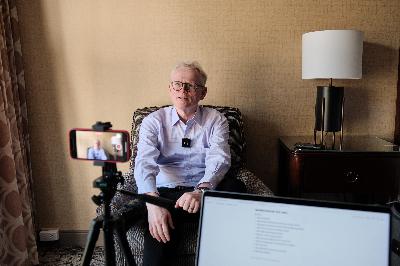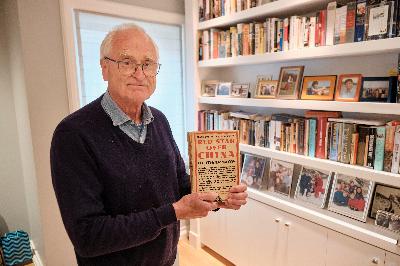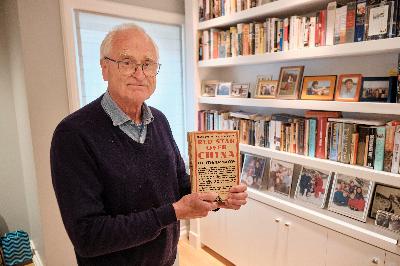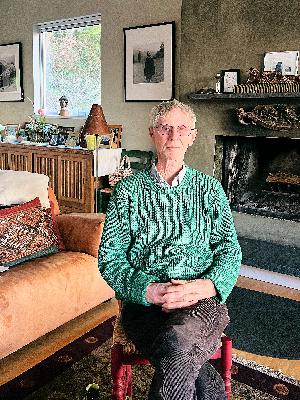Discover Peking Hotel with Liu He
Peking Hotel with Liu He

Peking Hotel with Liu He
Author: Liu He
Subscribed: 7Played: 93Subscribe
Share
© Liu He
Description
The Peking Hotel podcast and newsletter are digital publications in which Liu He interviews China specialists about their first-hand experiences and observations from decades past. Their stories are a reminder of what China used to be and what it is capable of becoming.
pekinghotel.substack.com
pekinghotel.substack.com
19 Episodes
Reverse
Hoover Institution research fellow Dr. Alice Miller talks about how, as a CIA analyst, she could figure out political changes in China were afoot based on state media articles.About Peking HotelThe Peking Hotel podcast and newsletter are digital publications in which Liu He interviews China specialists about their first-hand experiences and observations from decades past. The project grew out of Liu’s research at Hoover Institution collecting oral history of China experts living in the U.S. Their stories are a reminder of what China used to be and what it is capable of becoming.Podcast music Hungarian Dance no. 5 Re-imagined, Guy Mintus, Johannes Brahms, Artlist Classics, Artlist Original Music Get full access to Peking Hotel at pekinghotel.substack.com/subscribe
Author Ian Johnson talks about how he returned to China in 2009 to write his books ‘The Souls of China’ and ‘Sparks,’ which both deal with China's search for meaning.About Peking HotelThe Peking Hotel podcast and newsletter are digital publications in which Liu He interviews China specialists about their first-hand experiences and observations from decades past. The project grew out of Liu’s research at Hoover Institution collecting oral history of China experts living in the U.S. Their stories are a reminder of what China used to be and what it is capable of becoming.Podcast music Piano Sonata No. 1 in F Minor, Op. 2, Artlist Classics, Ludwig van Beethoven, Raviv Leibzirer, Artlist Original Music Get full access to Peking Hotel at pekinghotel.substack.com/subscribe
Stephen Roach talks about how, as the former chairman of Morgan Stanley Asia, h ehad the hear of many Asian political leaders. But as he became more pessimistic about the Chinese economy, China’s leadership became less interested in what he had to say.About Peking HotelThe Peking Hotel podcast and newsletter are digital publications in which Liu He interviews China specialists about their first-hand experiences and observations from decades past. The project grew out of Liu’s research at Hoover Institution collecting oral history of China experts living in the U.S. Their stories are a reminder of what China used to be and what it is capable of becoming.Podcast musicTommy H. Brandon, The Last Road Trip. Artlist Original Music.Tomer Lavie, Silky Secrets. Artlist Original Music.Roie Shpigler, Clarity. Artlist Original Music.PBS, American Experience: Police Tactics at the Dow Demonstration. 2017. Get full access to Peking Hotel at pekinghotel.substack.com/subscribe
Associate professor David Moser talks about how he has been a bridge between the U.S. and China. After so many decades, he’s disappointed in both countries. But China remains his “drug of choice.”Subscribe to our Substack newsletter at pekinghotel.substack.comPodcast music: Mélodie, Kobi Salomon, Artlist Classics, Edvard Grieg, Ezequiel Jait, Artlist Original MusicAbout Peking HotelThe Peking Hotel podcast and newsletter are digital publications in which Liu He interviews China specialists about their first-hand experiences and observations from decades past. The project grew out of Liu’s research at Hoover Institution collecting oral history of China experts living in the U.S. Their stories are a reminder of what China used to be and what it is capable of becoming. Get full access to Peking Hotel at pekinghotel.substack.com/subscribe
What’s it like for a foreigner to perform Xiangsheng—China’s traditional crosstalk comedy—on the biggest stage in the Sinophone world, the CCTV Spring Festival Gala?In 1999, David Moser did just that. Now an Associate Professor at Beijing Capital Normal University, David had already spent a decade in China by then, studying Xiangsheng under Master Ding Guangquan, translating books, and helping seed China’s underground jazz scene.Yet, despite his intimidating list of talents, when you meet him, you can’t help but call him ‘Lao Mo’ (老莫). He’s a jolly, funny, dynamic friend to spend time with. I will say no more than that this is the most entertaining chat I’ve done for Peking Hotel. I hope you feel the same too.For quick navigation to the specific sections:* What is it like to perform Xiangsheng in front of a billion Chinese people?* A musician wanders into the Sinophone world through tongue-twisters and translation* Translating one of the first books on AI in China with half-baked Chinese* When Ancient Greek meets Ancient Chinese* Apprenticing under Ding Guangquan, a Xinagsheng MasterMusic: High Rollin, Stefano Mastronardi, Artlist Original MusicSubscribe to our Substack newsletter at pekinghotel.substack.comAbout Peking HotelThe Peking Hotel podcast and newsletter are digital publications in which Liu He interviews China specialists about their first-hand experiences and observations from decades past. The project grew out of Liu’s research at Hoover Institution collecting oral history of China experts living in the U.S. Their stories are a reminder of what China used to be and what it is capable of becoming.Get full access to Peking Hotel at pekinghotel.substack.com/subscribe Get full access to Peking Hotel at pekinghotel.substack.com/subscribe
Prof. Judith Shapiro reflects on how the environment used to be a cause for which Chinese civil society was allowed to fight, until that too became sensitive.Host: Liu HeSubscribe to our Substack newsletter at pekinghotel.substack.comAbout Peking HotelThe Peking Hotel podcast and newsletter are digital publications in which Liu He interviews China specialists about their first-hand experiences and observations from decades past. The project grew out of Liu’s research at Hoover Institution collecting oral history of China experts living in the U.S. Their stories are a reminder of what China used to be and what it is capable of becoming. Get full access to Peking Hotel at pekinghotel.substack.com/subscribe
Before her career switch to researching environmental politics, Prof. Judith Shapiro spent a whirlwind decade teaching, writing, and living in and about China as it awakened from the Mao era. Get full access to Peking Hotel at pekinghotel.substack.com/subscribe
Democracy scholar Larry Diamond discusses why democratisation in China and Hong Kong failed, and how activists can keep the global movement against autocracy going as the U.S. turns isolationist.Follow our Substack at Peking HotelAbout usThe Peking Hotel podcast and newsletter are digital publications in which Liu He interviews China specialists about their first-hand experiences and observations from decades past. The project grew out of Liu’s research at Hoover Institution collecting oral history of China experts living in the U.S. Their stories are a reminder of what China used to be and what it is capable of becoming. Get full access to Peking Hotel at pekinghotel.substack.com/subscribe
For quick navigation:China’s qiqong feverChasing the Falun Gong beat in Beijing and around ChinaWinning the PulitzerRecommended Readings:David Ownby, 1996, Brotherhoods and Secret Societies in Early and Mid-Qing China, Standford UniversitIan Johnson, 2004, Wild Grass, PantheonDavid A. Palmer, 2007, Qigong Fever, Columbia University PressDavid Ownby, 2008, Falun Gong and the Future of China, Oxford University PressIan Johnson, 2017, Souls of China, Knopf DoubledayIan Johnson, 2023, Sparks, Oxford University PressAbout usThe Peking Hotel podcast and newsletter are digital publications in which Liu He interviews China specialists about their first-hand experiences and observations from decades past. The project grew out of Liu’s research at Hoover Institution collecting oral history of China experts living in the U.S. Their stories are a reminder of what China used to be and what it is capable of becoming.We also have a Chinese-language Substack. We hope to publish more conversations like this one, so stay tuned!Thanks for reading Peking Hotel! This post is public so feel free to share it. Get full access to Peking Hotel at pekinghotel.substack.com/subscribe
Click here for Lunar New Year community livestreaming signup. 6pm Pacific Time, Jan 29thI never deliberately timed this piece with the presidential inauguration of Donald Trump, yet now that we have stumbled upon this occasion, it also seems fitting. For to answer the question “what will Trump do about China?” it is necessary to revisit and review the recent history of U.S.-China relations, the dynamics of both American and Chinese domestic politics, and the macro forces shaping the political environment. Luckily, we are gifted with another piece of oral history from our honorable guest, Prof. Susan Shirk of UC San Diego.Followers of this Substack will find her a familiar figure, for we have so far published two pieces of her oral history (part one and part two). For new readers, I will introduce Prof. Shirk again: She is a research professor at the UC San Diego School of Global Policy and Strategy, director-emeritus of the 21st Century China Center, and director-emeritus of the UC Institute on Global Conflict and Cooperation (IGCC). She is one of the West’s foremost thinkers on Chinese elite politics and political institutions, who, having first travelled to China in the early ‘70s, has witnessed the country from the Mao to the Xi eras. Between 1997 and 2000, Susan served in the Clinton administration as the Deputy Assistant Secretary of State, overseeing U.S. relations with China, Taiwan, Hong Kong, and Mongolia.This interview took place last summer. Much has happened since then, not least the election of Trump. Some parts of this interview may be slightly outdated, but I find it holds up well. Many regard Trump as a hawkish figure on China, so it is refreshing to hear Susan raise the possibility of a U.S.-China reengagement under Trump. America has a history of anti-communist presidents exercising a policy of engagement, from Richard Nixon to Ronald Reagan; being anti-communist is almost a prerequisite in American politics to practice rapprochement, since only then are you trusted enough to speak to enemies. Maybe history will repeat itself under Trump.However, most of this interview — which was edited for brevity and clarity — is not about Trump but about China’s own political future. We review missed opportunities and key turning points in the recent history of U.S.-China relations, political changes under Xi Jinping, Susan’s personal relationships with key Chinese foreign policy figures Wang Yi and Fu Ying, and a contemplation of Chinese politics after Xi.Hope you enjoy.Best,LeoFor quick navigation to the specific sections:The death of U.S.-China cooperation: “China’s behaviour changed. Our reaction also changed.”Discontent and dictatorial leadership under XiChina during the “garbage time of history” and beyondPeking Hotel is a reader-supported publication. To receive new posts and support my work, consider becoming a free or paid subscriber.Recommended readingsSusan Shirk, 2022, Overreach, Oxford University PressSusan Shirk, 1993, The Political Logic of Economic Reform in China, University of California PressAbout usThe Peking Hotel podcast and newsletter are digital publications in which Liu He interviews China specialists about their first-hand experiences and observations from decades past. The project grew out of Liu’s research at Hoover Institution collecting oral history of China experts living in the U.S. Their stories are a reminder of what China used to be and what it is capable of becoming.We also have a Chinese-language Substack. We hope to publish more conversations like this one, so stay tuned!Thanks for reading Peking Hotel! This post is public so feel free to share it. Get full access to Peking Hotel at pekinghotel.substack.com/subscribe
Susan Shirk discusses more events that happened during her time in the Clinton Administration, including NATO's accidental bombing of the Chinese embassy in Belgrade, Falun Gong protests in Beijing, and Jiang Zemin's visit to the U.S.Substack: https://pekinghotel.substack.comInstagram: peking.hotelAnd please tell your friends about us! https://pekinghotel.substack.com/p/do-you-enjoy-reading-peking-hotel Get full access to Peking Hotel at pekinghotel.substack.com/subscribe
In this episode of Peking Hotel, China scholar Susan Shirk discusses how she joined the Clinton administration, negotiated the WTO deal, and lost faith in the U.S. ability to improve human rights in China. Get full access to Peking Hotel at pekinghotel.substack.com/subscribe
Liu He speaks with Ian Johnson, a longtime China journalist and the author of the recent book "Sparks," about his first experiences in China, his reflections on foreign reporting, and his own career covering the country.The Peking Hotel podcast and newsletter are digital publications in which Liu He interviews China specialists about their first-hand experiences and observations from decades past. The project grew out of Liu’s research at Hoover Institution collecting oral history of China experts living in the U.S. Their stories are a reminder of what China used to be and what it is capable of becoming.Please follow us on Substack, Instagram, LinkedIn.欢迎关注百京饭店中文版! Get full access to Peking Hotel at pekinghotel.substack.com/subscribe
Fox Butterfield is a Pulitzer-winning journalist who has served in Saigon, Tokyo, Hong Kong, Beijing, Boston, Washington and New York City. He was the first China correspondent of the New York Times since 1949 and opened the Beijing Bureau of the Times in 1979, just after diplomatic relations between China and the US normalised. His journalistic book on China, Alive In The Bitter Sea, became a best-seller and phenomenon in the early 80s, launching the genre of journalist books on contemporary China that generations of journalists soon followed.I sat down with Fox in late July at his Portland home to record his personal oral history, and take us back to those magical years when China first began to open up in the 70s and early 80s. Fox has the unique vantage point as an Asia correspondent in the Cold War and one of the first American journalists to report in China. His narrative threads together a multifaceted story of a China specialist, informed and enriched by the Cold War context, a Harvard education, journalistic experience in America and Vietnam War, and a life-long interest in China. I walked away from the conversation feeling entertained by Fox’s quirky tales and grounded in the gravitas of the historical context. I hope you will find it interesting too.This is an episode co-produced with China Books Review, a digital magazine publishing intelligent commentary on all things China and bookish. This issue stitches together two episodes of Fox Butterfield’s oral history most relevant to China, and provides a one-episode overview of his China journey. You may safely skip this one if you have already listened to our previous two piecesSpecial thanks to Aorui Pi who edited this audio piece.About usPeking Hotel is a bilingual online publication that takes you down memory lane of recent history in China and narrates China’s reality through the personal tales of China experts. Through biweekly podcasts and newsletters, we present colourful first-person accounts of seasoned China experts. The project grew out of Leo’s research at Hoover Institution, where he collects oral histories of prominent China watchers in the West.Lastly…Speaking to these thoughtful individuals and sharing their stories with you has been a privilege. Their stories often remind me of what China used to be and what it is capable of becoming. I hope to publish more conversations like this one, so stay tuned!Please follow our Peking Hotel Substack page for more. We also have a Chinese-language Substack.If you are on Instagram, follow us @peking.hotel. Get full access to Peking Hotel at pekinghotel.substack.com/subscribe
When I arrived at Fox’s place, his chocolate lab, Charlie, greeted me with a wagging tail. The rainy weather outside, unfortunately, obscured what otherwise promised to be a stunning view of Mount Hood from Fox’s living room. But the conversation more than made up for what I missed in the landscape. Fox poured me a glass of water and sat opposite me on a grey sofa, wearing a navy blue jumper.Early this month, we published a piece about Fox’s early study of China under John Fairbank at Harvard and his reporting in Vietnam during the war. The last piece builds up towards this one, which delves into how Fox opened the first Beijing Bureau of The New York Times – the main reason that got me interested in his oral history in the first place.The press, as a quintessential part of America’s cultural entourage, brought a new window for the American public to understand China. It also symbolised a gesture of goodwill from the Chinese government toward the Western world. On the ground reporting in China was a pivotal step in bridging the two nations and making China’s reality more accessible to the world. For the keen and curious minds, Mike Chinoy’s Assignment China: An Oral History of American Journalists in the People’s Republic offers compelling accounts from American journalists about their early experiences in the country. Forty years later, this history is only beginning to be told.Shownotes:10:29 Butterfield on Deng and Zhao Ziyang13:27 Reflections on China’s attack on Vietnam15:58 US’s critical lens on China19:35 NYT’s Beijing Bureau at Peking Hotel29:15 Day in life as a China correspondent32:13 Life after China39:45 Interactions with American politicians40:41 Impression on Obama45:23 Interactions with TrumpEnjoy.LeoThe editors of this episode is Caiwei Chen and Aorui Pi.If you are on Instagram, follow us @peking.hotel. Speaking to these thoughtful individuals and sharing their stories with you has been a privilege. Their stories often remind me of what China used to be and what it is capable of becoming. I hope to publish more conversations like this one, so stay tuned! Get full access to Peking Hotel at pekinghotel.substack.com/subscribe
It was fun seeing Fox Butterfield, the first New York Times correspondent in China since 1949, in Portland, Oregon back in July. I last visited Portland in 2022, and you never quite get over the sight of Mount Hood dominating the horizon on a clear summer day in its awesome fashion.Fox welcomed me to his home, perched on a small hill in a modestly upscale suburb. A history enthusiast, he has lived through and witnessed some of the most pivotal moments in modern history: from meeting Harry Truman as a teenager with his grandfather, to studying under John Fairbank, the progenitor of Chinese studies in America, to reporting on the Vietnam War and helping expose the Pentagon Papers, which earned him a Pulitzer Prize. Though trained as a China specialist, he only began his reporting inside China in the late '70s, culminating in his book China: Alive in the Bitter Sea. This bestseller set a benchmark for generations of China correspondents. Later in his career, Fox shifted his focus to domestic issues of race and crime, writing acclaimed works like All God’s Children and In My Father’s House.Talking to Fox was a breeze. I was pleasantly surprised that his spoken Chinese remains impressively sharp — his tones and pronunciations are still spot-on. Of course, we did most of our chatting in English. This piece will explore his early experiences, particularly his family background, his time at Harvard, and his reporting during the Vietnam War. While the bulk of the piece may not focus directly on China, it offers a glimpse into the intellectual formation of one of America's most prominent China watchers and how both domestic and global forces shape U.S. perceptions of China.Enjoy!LeoIndexSeeing China with Joe Biden and John McCain in the 70sCyrus Eaton, Lenin Prize and family legacy in Cold War“Rice Paddies”, and studying under John Fairbank at HarvardFrom Pentagon Papers to VietnamReporting on the frontlines in Vietnam Seeing China with Joe Biden and John McCain in the 70sCould you talk about your first trip to China?I was the Hong Kong correspondent for The New York Times from 1975 to 1979 because that’s where we covered China in those days. I couldn’t go to China until 1978, when I attended the Canton Trade Fair. That was my first trip to China; I can barely remember it.My second trip to China was much more memorable. In 1979, when the U.S. and China were about to normalize relations, China invited the Senate Foreign Relations Committee to visit, and I was invited as a New York Times correspondent. In those days, China had a shortage of hotel rooms, at least for foreigners, so they made everybody room with somebody else. The Chinese government assigned me to room with the naval liaison to the Senate Foreign Relations Committee, who was a Navy captain named John McCain.For two weeks, John McCain and I were roommates. We had breakfast, lunch, and dinner together and traveled everywhere. McCain's best friend on the Senate Foreign Relations Committee was Joe Biden. So, the three of us did almost everything together for two weeks. That one is easy to remember. What was your impression of Joe Biden?Joe Biden was a nice man, very earnest, but he was a typical career politician that when he approached somebody, he always grabbed them by the hand. He was tall, had a strong handshake, and would give them a big smile and grab their hands. He kept doing this to the Chinese, who didn't really know what was going on because they're not used to being touched that way, especially not somebody almost breaking their hand.So I finally said to him, “Senator.” And he'd say, “No, call me Joe.” I said, “Okay, Joe, please don't grab Chinese by the hand. It's kind of rude and offensive to them, and they don't understand it.” He would say, “Well, why not?” And I said, “Because that's not their custom.” He'd say, “Okay, thank you very much.” And then, five minutes later, he'd do the same thing over and over again.John McCain and I became good friends, especially because I had seen McCain in prison in Hanoi when I first started working for The New York Times, and we bonded over that shared history during our trip to China. They allowed me to go into his prison in 1969, and I was the first reporter to find out that John McCain was still alive when his jet fighter was shot down over Hanoi.I saw him then and as roommates 10 years later in China. We had a great time, and I would take him out and say, “Let's sneak away from our handlers and see how Chinese really live and what they really say.” We just went out and talked to people, and he thought this was a lot of fun.“He said something straightforward and obvious, but I had never thought about it. He said China is the oldest country in the world with by far the largest population. It's a big, important place.”That’s a wonderful tale. What made you initially interested in China?When I was a sophomore at Harvard as an undergraduate in 1958, there was a fear that the United States was going to have to go to war with China over those two little islands, which Americans call ‘Quemoy’ and ‘Matsu’ and Chinese people call ‘Jinmen’ and ‘Mazu’.America's leading sinologist and Harvard professor of Chinese studies, John Fairbank, decided to give a public lecture about the danger of the United States going to war for those two little islands.I attended his lecture. He said something straightforward and obvious, but I had never thought about it. He said China is the oldest country in the world with by far the largest population. It's a big, important place. Why would the United States want to go to war with China over those two little islands? It made no sense logically. And we had just finished the war in Korea. As I listened to him, I realized, “Gee, I don't know anything about that place.”So I began to audit his introductory class on the history of East Asia. And in the spring, I decided to take a second class in Chinese history that Fairbank was teaching. As a Harvard undergraduate, I would find out my exam grades at the end of year from a postcard you put in the exam booklet. When I received my postcard back from the final exam, it said: “please come to see me in my office, tomorrow morning at 10.” “Oh no,” I thought I really screwed up my exam. So I went to see John Fairbank. I was nervous, especially because he was a great man, a big figure on campus, and the Dean of Chinese studies in the United States. So I went in, and he said, “Fox, you wrote a wonderful exam. Have you considered majoring in Chinese history?” I went, “oh, no, I had not considered it.” I was so relieved that I had written a good exam.He said, “Well, if you are, you must immediately begin studying Chinese.” At that time, Harvard did not teach spoken Chinese, only classical written Chinese, and there were just about 10 people, all graduate students.So Fairbank said, “here's what you do. Going down to Yale, they have a special program that teaches spoken Chinese in the summer because they have a contract with the Air Force to teach 18-year-old Air Force recruits how to speak Chinese so they can listen to and monitor Chinese air force traffic.”So I spent the summer at Yale studying Chinese with air force recruits. I took classical written Chinese classes when I returned to Harvard that fall. Luckily, I got a Fulbright Fellowship to go to Taiwan after I graduated, so I studied in the best spoken Chinese program at the time run by Cornell University.Cyrus Eaton, Lenin Prize and family legacy in Cold WarI wonder whether there's any family influence on your China journey. Your father was the historian and editor-in-chief of the Adams Papers, and your maternal grandfather, Cyrus Eaton, was one of the most prominent financiers and philanthropists in the Midwest. Could you speak on the impact of family legacy on your China journey?My father certainly instilled a love of history in me. That was always my favourite subject in school and the one I did best in. Eventually, my major at Harvard was Chinese history. My father didn't know anything about China and never went. My mother visited Taiwan and stayed with me for ten days in the 60s.My maternal grandfather, Cyrus Eaton, would fit the Chinese notion of a rags-to-riches success story. He grew up in a small fishing village in Nova Scotia, Canada, and went to college in Toronto with the help of an older cousin. This cousin went on to become a Baptist minister in Cleveland, Ohio, across the lake. Among the people in his parish was a man named John D. Rockefeller — yes, the original John D. Rockefeller.The cousin invited my grandfather and said he had a job for him. So my grandfather started off as a golf caddy for John D. Rockefeller and then a messenger. Ultimately, he founded his own electric power company in Cleveland — Ohio Electric Power — and became quite influential. He had multiple companies but then lost everything in the Great Depression.During World War II, my grandfather heard about a large iron ore under a lake in Ontario through his Canadian connections. By then, he had already formed connections with President Roosevelt and then Truman, so he said, “If you can give me some money and help underwrite this, I can get Canadian permission to drain the lake for the iron ore deposit,” which became the world’s richest iron ore mine, Steep Rock Iron Ore. That’s how he got back into business. Truman and my grandfather ended up having a close connection, and he used my grandfather's train to campaign for re-election in 1948. My grandfather was an unusual man. He had a real vision about things.He was trading metals with the Soviet Union as well.I don't know the details, but when Khrushchev came to power, my grandfather became interested in trying to work out some arrangement between the United States and Russia, which is where the Pugwash movement came from. He was inviting Russian and American scientists to meet. They couldn’t meet in the U.S. because it was against American law, but he arranged
Arriving at Orville’s place takes you through a scenic drive on the Berkeley Hills. Quintessential to the Bay Area, driving on the steep, winding roads feels like the slow climbing of a rollercoaster. At the summit, glimpses of the Golden Gates Bridge peek through the misty clouds. On a clear day, the urban sprawl of San Francisco, Berkeley and Albany unfolds beneath you; even on a rainy day, the charming neighbourhoods with Berkeley Bungalows more than make up for the long drive from Palo Alto.Orville Schell will be familiar to our returning readers. We have featured him twice before, once on his experience in the 60s, and again in the 80s. A veteran journalist and currently the Arthur Ross Director of the Center on US-China Relations at the Asia Society, Orville has given us insight into how foreign China watchers navigated the challenges of the Cold War and how China’s gradual shift from socialism in the 1980s. In this issue, we explore Orville’s experience in the Vietnam War – a transformative event for an entire generation of Americans and a key moment that shaped his consciousness as a China scholar. Orville, as someone deeply embedded in the American China-watching community, sheds light on the often-overlooked impact of the Vietnam War on Western perceptions of China.A brief hiatus in the summer has recharged Peking Hotel well. We now have a new and brilliant editing team, so it’s not just myself sifting through mountains of tapes anymore (hurray!). We will aim to release a new episode every two weeks, and your continued interest is our best accountability measure :)I thank my wonderful editors Yiwen Lu and Caiwei Chen for their support.Enjoy!Leo Get full access to Peking Hotel at pekinghotel.substack.com/subscribe
Welcome back!My first piece on Orville’s experience in the 80s had good reader reception, many thanks to your support! This piece focuses on Orville's story in the 60s and 70s working on China. Orville Schell is the Director of Center on US-China Relations at the Asia Society.In this one, you will hear about Orville’s grandfather who taught medicine in Changsha in late qing; his semi-activist mom; studying with John Fairbank at Harvard; drinking tea with Chiang Kai-shek in Taipei; locked in a cave by CCP officials on his first trip to China; and getting chased out of Indonesia by the Indonesian communists. It shines a light on a not-so-distant era. Not sure about you; I certainly hear many echoes with our time.Enjoy!Content- Changsha, Tahiti, and Taiwan- First trip to China and a wake-up call- Living in Taiwan, dreaming of Beijing- John Fairbank and Edgar Snow- ‘Ganyang America!’ (‘Crush America’ in Indonesian)About usThe Peking Hotel podcast and newsletter are bilingual online publications that take you down memory lane of recent history in China and narrate China’s reality through the personal tales of China experts. We present subjective, opinionated, and coloured views of veterans in the field based on their first-hand experience and direct observations. The project grew out of Leo’s research at Hoover Institution where he collects long oral history of China experts living in America. The stories here are a reminder of what China used to be and what it is capable of becoming. We have Substacks in English and Chinese. Do subscribe!RecruitmentI am recruiting a part-time editorial helpers for this Substack. Drop me an email with your CV and a short self-intro at heliu@stanford.edu if you are interested.https://pekinghotel.substack.comhttps://www.the-mayfly.com/s/peking-hotel Get full access to Peking Hotel at pekinghotel.substack.com/subscribe
Orville Schell on his experience in China in the 1980s, a magical decade in recent history that brought hope, optimism, dynamism and endless possibilities in China, and ended with Tiananmen Massacre.The Peking Hotel podcast and newsletter are a bilingual online publication that takes you down memory lane of recent history in China, and narrates China’s reality through the personal tales of China experts. We present subjective, opinionated, and coloured views of veterans in the field based on their first-hand experience and direct observations. The project grew out of Leo’s research at Hoover Institution where he collects long oral history of China experts living in America. The stories here are a reminder of what China used to be and what it is capable of becoming. This episode is co-produced with China Books Review, a new digital magazine about everything China and bookish. A special shoutout to the editor, Alec, for supporting the Peking Hotel and to Taili Ni for sound-editing.Since this is only my first episode, any feedback from our audience (you!) is warmly appreciated. We also have Substacks in English and Chinese. I hope to publish more conversations like this one, so stay tuned!I am recruiting a producer and editor to help me run this publication. Email heliu@stanford.edu if you are interested. Get full access to Peking Hotel at pekinghotel.substack.com/subscribe


